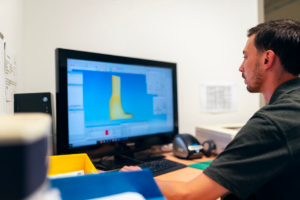
The technological advancements of the 21st century have revolutionized countless industries, including construction. The introduction of new tools and machinery, advanced materials, and sophisticated software has reshaped the way we design, plan, and execute construction projects. The use of Building Information Modeling (BIM) software, for instance, has increased by 12% in the last decade, enhancing efficiency and reducing errors in construction projects. Drone technology is another game changer, with a reported 239% growth in usage within construction over the last year. These modern technologies not only enhance the productivity and safety aspects of construction but also have a profound impact on career training in the industry. They necessitate a new set of skills, transforming traditional methods of training and creating a demand for tech-savvy professionals in the field.
Soft Skills Training and Adapting to New Machines
Problem-solving skills, adaptability, and the ability to work in diverse teams are all increasingly important in a technologically driven construction industry. Even choosing options like learning a new machine, joining a project without prior knowledge, and communicating with team members in different countries are all part of the skill set required to thrive in modern construction. With this shift comes a need for training programs that prioritize soft skills development. Of course, you should always read more about the particular machines and tools that you will be using on the job, or planning to get in a course for, but it is equally important to hone soft skills that can’t necessarily be taught by reading a manual. As an individual working in construction, improving your soft skills through training programs will make you more attractive to employers and increase your chances of success.
Introduction of Virtual Reality (VR) and Augmented Reality (AR) in Training
These technologies provide a safe and immersive environment for trainees to practice and hone their skills. Trainees can simulate different construction scenarios, understand the nuances of operating complex machinery, and learn to manage unforeseen challenges, all in a risk-free setting. With the incorporation of VR and AR in training, potential risks associated with on-site learning are eliminated, reducing accidents and promoting a culture of safety. Furthermore, these technologies can be used to train workers remotely, allowing for more flexible and efficient training schedules. As a result, companies can save time and resources while providing comprehensive and effective training programs to their employees.
Adoption of Building Information Modeling (BIM) Software
Proficiency in BIM software is becoming increasingly crucial for modern construction professionals. It enhances their ability to visualize, plan, and manage construction projects more efficiently, thereby reducing errors and cost overruns. Due to its widespread use, it has become a necessary skill for individuals seeking employment in the construction industry. As a result, training programs are now incorporating BIM software into their curriculum, equipping trainees with the necessary skills to succeed in the ever-evolving construction landscape. From architects and engineers to construction managers and contractors, everyone involved in the industry must be proficient in BIM software to remain competitive.
Increasing Use of Drones in Construction
The knowledge of drone operation and the ability to interpret drone-captured data has become valuable skills in the construction industry. Drones can effectively monitor construction progress and identify potential safety hazards on site. As such, many companies are now incorporating drone training into their career development programs. By learning how to operate and analyze data from drones, individuals can improve their employability and contribute to the growth of the industry. For those who are already employed in construction, acquiring these skills can open up new opportunities for advancement within their organizations.

3D Printing and Prefabrication
The advent of 3D printing technology and prefabrication methods has brought about a shift in construction processes. Professionals trained in these technologies can contribute to building more sustainable and cost-effective structures. 3D printing has been used to create intricate designs and models, aiding in the visualization and planning stages of construction projects. Prefabrication, on the other hand, allows for faster production of building components off-site, reducing construction time and minimizing waste. As a result, training programs are incorporating these technologies into their curriculum to equip individuals with the necessary skills to keep up with the changing demands of the industry.
Digital Literacy and IT Skills
With construction becoming increasingly digitized, IT literacy is a must for modern construction professionals. Skills in digital project management, data analysis, and cybersecurity are highly sought after. As technology continues to advance, construction companies will require individuals with the ability to adapt and learn new software and tools quickly. Therefore, training programs must include opportunities for trainees to develop their digital literacy skills, ensuring they are competent in utilizing technology to its fullest potential. For those already working in the industry, continuous learning and upskilling will be necessary to stay relevant and competitive.
The integration of new tools and machinery, sophisticated software, and innovative methods has transformed traditional training programs, creating a demand for individuals with a diverse set of skills. Soft skills training, virtual and augmented reality, BIM software, drone operation, 3D printing and prefabrication methods, and digital literacy are all essential aspects of modern construction career training. As the industry continues to evolve, individuals must prioritize continuous learning and upskilling to remain competitive in the workforce. Embracing technological advancements and developing new skill sets will pave the way for a successful and fulfilling career in the ever-changing world of construction.




